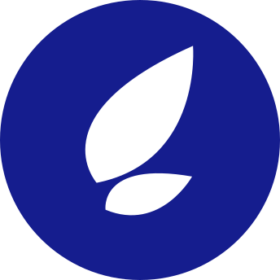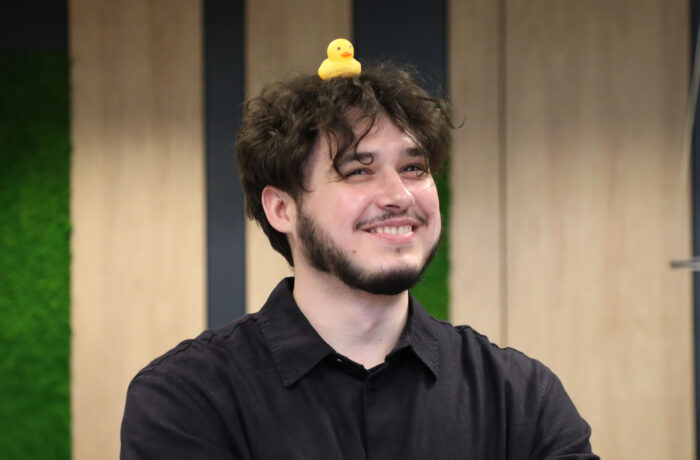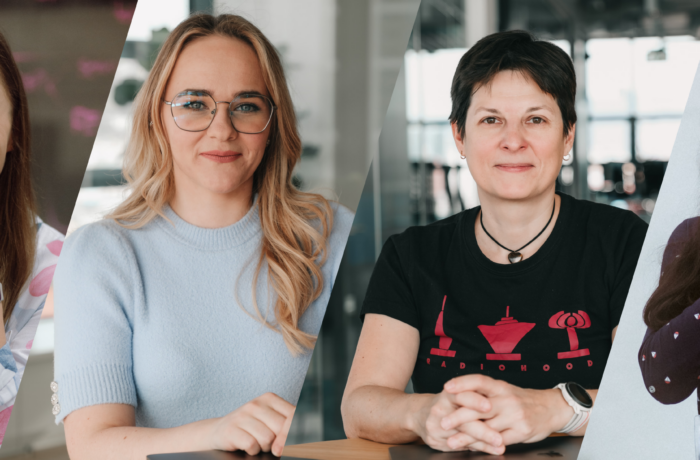We admire people with a passion for knowledge, always looking for ways to grow. Our colleagues have taken a further step — they spend part of their free time lecturing and tutoring others, may it be young students, beginner developers, or tech enthusiasts from all work fields. How have they managed to align work and their passion for teaching? What’s the most satisfying part of this hard, but fruitful work? We interviewed Ivetka and Jaro to give you a closer peek into the wondrous moments of new tech enthusiasts being born.
What’s your current job position at GoHealth, and what exactly are your duties?
Ivetka: Currently I’m working as a Senior Software Engineer and my main duties include the development of GoHealth’s products, communication with our non-technical colleagues, and mentoring junior team members.
Jaro: At GoHealth I’m working as a Senior Software Engineer. My goal is to focus on delivering functioning solutions — not just software. This requires communication with non-technical staff and ensuring that requirements are well understood. This is very often a critical part of the whole process.
Your day-to-day jobs aren’t the only activity you both engage in. Tell us something about your other passion — teaching and lecturing.
Ivetka: Outside of work, I like to engage in various training activities, I regularly mentor and lead workshops about the basics of programming or web development, which are intended for practically everyone — from elementary school students to programming novices. I also participated in several popularization lectures at the Technical University. Last but not least, I am dedicated to girls or women who love software development, but lack role models, and courage and have a broader knowledge about this profession. At GoHealth, we’ve already participated in Girl’s Day, an event organized by Aj ty v IT, a non-profit organization, twice. We introduced our work and the world of programming to secondary school students in a playful way.
Jaro: The most prominent activity I’m engaged in outside GoHealth is openSpace inAgile un-conference for Slovak and Czech agile communities. Unlike traditional conferences, no agenda and speakers are known upfront. It is based on discussions rather than lecturing with a single speaker and many listeners. This format is highly self-organized. We typically get feedback that attendees learned a lot during the discussions.
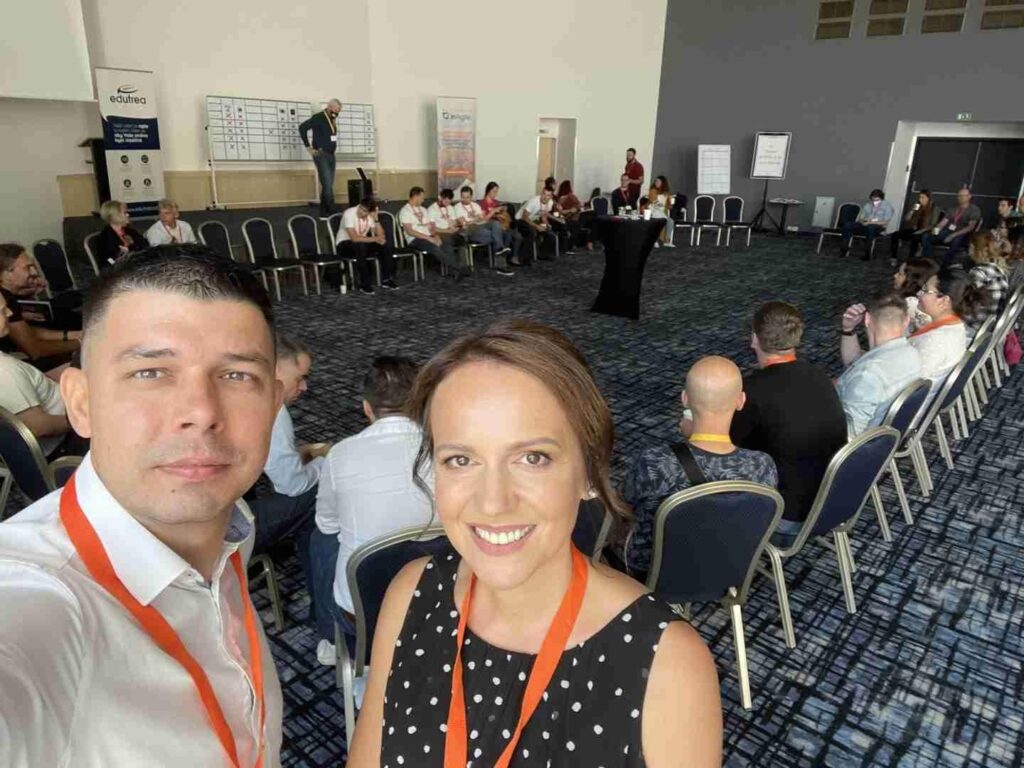
What do you specialize in during your lectures or conferences?
Ivetka: I focus primarily on providing information in an informal way. Above all, workshops related to software development are quite difficult for novice people, therefore I consider it very critical to approach them in the most digestible way possible, using a lot of examples, funny pictures, and, of course, a friendly expression. Neglecting these factors can easily lead to the discouragement of interested parties, which we cannot afford at this time when we lack a huge number of specialists.
Jaro: The topics are brought by attendees; it’s driven by what they are interested in. My role is to create the best environment for collaboration, discussions, and knowledge sharing among them. It is typically a pretty wide range of topics about agile, but to list just a few: How to scale growing organizations? How to motivate people? How to manage projects and products? From the team level to the organizational level. From discussing cultural questions to discussing techniques.
We all know that standing and performing in front of many people can be a little intimidating. What’s the driving force and intentions behind Ivet and Jaros‘ enthusiasm?
What do you love the most about presenting and giving lectures?
Ivetka: I really enjoy the feedback from the participants. Especially when I see that I managed to impress them and I captured their attention. When they really get involved, they ask questions during the entire lecture. Very often they stop by and thank me for the „kick“ towards further studies. The fact that many of my lectures are held repeatedly and people request them is probably the biggest compliment.
Jaro: As I’ve said, rather than giving lectures, I’m setting up the environment for what I call knowledge sharing on steroids. What do I like most about it? Seeing the faces of people that are at our event for the first time surprised by the overwhelming amount of knowledge all around.
What made you even consider getting on stage and lecture dozens of people?
Ivetka: I started to enjoy lecturing during my Ph.D. studies, where it’s an essential part of the program. That’s when I realized the importance of the lecturer and the way he presents the information. I started experimenting with different forms and after finishing my studies, I transferred the acquired knowledge to other platforms. I am constantly working on improvement, and I always enjoy it.
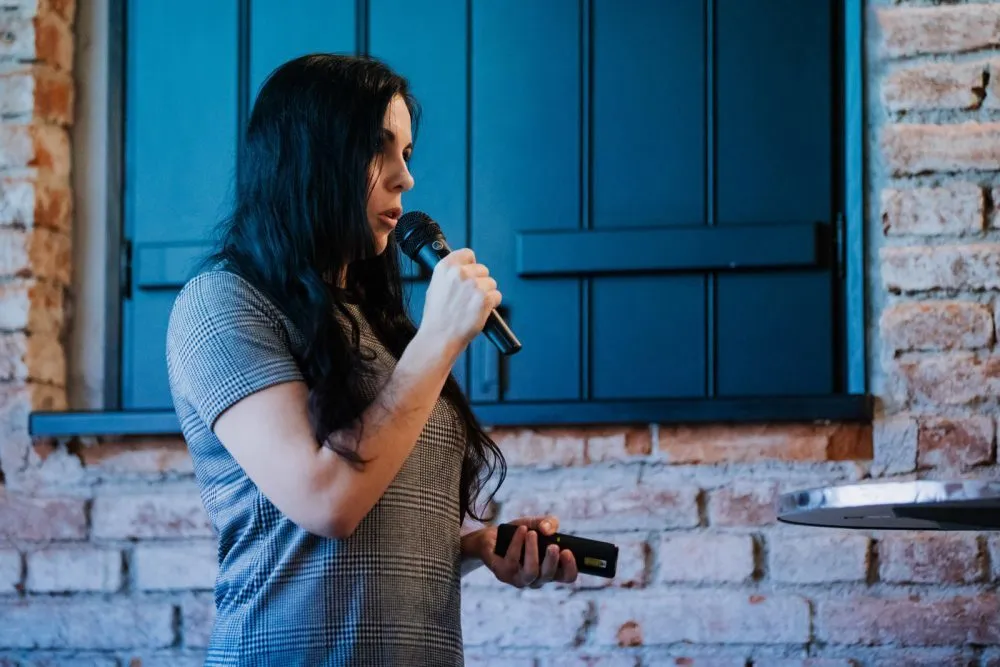
Jaro: When I started promoting agile events and meetups — many years before we started with open spaces — agile was not such a buzzword as it became later. That was before corporates discovered agile. I found it pretty cool and useful and I did not understand why there is only such a small number of companies that adopted agile in my area. That’s why I started to help with the promotion of these events and speak at them occasionally.
Do you remember any role model from your school or university times that inspired you to embark on a similar journey?
Ivetka: During my studies, I once had the opportunity to participate in a 6-hour workshop on parallel programming led by an expert from the US, Venkat Subramaniam. The description sounded rather uninspiring, but the lecturer was able to deliver it so well and interestingly that the hours flew by, I don’t even know how.
Jaro: During my university studies my favorite author was Martin Fowler. Then I discovered authors like Patrick Lencioni, Stephen Denning, and a few others. I like the way they write.
Why do you think it’s important for future developers to not only rely on their university knowledge? Why is constant upskilling so important?
Ivetka: Software development is moving forward so rapidly that many things become outdated in just 2 years. They say that in this field one must constantly run to at least stand still. University can provide solid foundations, but it is definitely not enough. Lifelong education and lots of practice are inevitable and at the same time irreplaceable.
Jaro: It’s important because we are living in a very dynamic world — not only from the perspective of software development. Fortunately, now we have techniques for rapid learning such as pair programming or teamwork. You don’t have to spend weekends studying. Try to listen to your colleagues and communicate. Do not live in your bubble. Learning from each other is funnier and more social.

What do you like to do in your free time? Where do you acquire new information or follow new trends?
Ivetka: In my free time, I try to take care of my well-being, which is why I try to spend more time relaxing with my two dogs, spending time with friends, or mountain biking. Now and then I get convinced to do some volunteer projects, such as creating websites for non-profits or community organizations like Adoptuj si posteľ, Sloníček, or Romalka. I am quite proud of the website for Sloboda zvierat, it was quite a challenge, but I managed to do it in my spare time.
Jaro: Currently I’m experiencing a stage of my life when I’m trying to learn to avoid doing anything productive during my free time. It’s not always easy. Right now I’m getting most of the information about new trends from my colleagues at work. They are really cool.
Have you ever wondered what are the biggest myths surrounding women in IT? Check out Ivetka’s article in Forbes.

